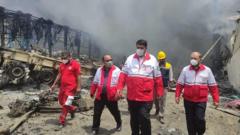After a catastrophic explosion at Shahid Rajaee port in Iran, resulting in multiple fatalities and extensive injuries, public sentiment has shifted from mourning to outrage. Accusations of negligence surround the handling of hazardous materials, as governmental investigations start to unveil accountability measures amid concerns over national security.
Outrage Follows Tragic Blast at Iran’s Shahid Rajaee Port, Calls for Accountability Emerge

Outrage Follows Tragic Blast at Iran’s Shahid Rajaee Port, Calls for Accountability Emerge
A devastating explosion at Iran's largest port has caused fears of incompetence as mourning shifts to public anger, questioning safety protocols and government handling of hazardous materials.
The recent explosion at Iran's Shahid Rajaee port, the country's largest commercial port, has sparked a wave of public mourning that quickly escalated into outrage. The tragic incident, which occurred on Saturday morning, resulted in at least 40 deaths and left over 1,000 injured, prompting a massive response from medical services across the nation as citizens rushed to hospitals to donate blood.
As thick plumes of black smoke hung over the port, local authorities advised nearby residents to remain indoors for safety, while all schools and government offices in Bandar Abbas, the closest city, were closed to facilitate emergency operations. Initial investigations revealed that raging fires had been detected in the area before the explosion, raising questions about the handling of dangerous materials stored at the port.
Ambrey Intelligence, a maritime risk consultancy, reported suspicions that the fire stemmed from improper management of containers loaded with solid fuel for Iranian ballistic missiles. Anonymous sources connected to Iran's Islamic Revolutionary Guard Corps revealed that sodium perchlorate, a key component in missile fuel, was among the materials involved. This speculation has led to public skepticism regarding the military's involvement, especially after some residents have pointed fingers at the authorities for negligence in managing hazardous substances.
In the wake of the disaster, Iranian President Masoud Pezeshkian pledged to investigate the root causes behind the explosion, underlining the importance of shielding the public from similar dangers in the future. Meanwhile, governmental assurances have been issued that the port, which serves as a crucial hub for nearly 80% of the country’s imports, will not face significant operations disruptions despite the chaos.
Compounding the tragedy is the international response, with messages of condolence pouring in from multiple countries, including the UAE and Russia. Russian President Vladimir Putin has even committed to sending specialized firefighting aircraft to assist with the aftermath of the disaster.
As investigations continue, public anger over government accountability mounts, and the broader implications for Iran's economy and security policies remain to be fully assessed. The port's operations are vital for food imports, and potential shortages loom on the horizon, adding another layer of complexity to an already tumultuous situation as the nation grapples with both grief and rage.
As thick plumes of black smoke hung over the port, local authorities advised nearby residents to remain indoors for safety, while all schools and government offices in Bandar Abbas, the closest city, were closed to facilitate emergency operations. Initial investigations revealed that raging fires had been detected in the area before the explosion, raising questions about the handling of dangerous materials stored at the port.
Ambrey Intelligence, a maritime risk consultancy, reported suspicions that the fire stemmed from improper management of containers loaded with solid fuel for Iranian ballistic missiles. Anonymous sources connected to Iran's Islamic Revolutionary Guard Corps revealed that sodium perchlorate, a key component in missile fuel, was among the materials involved. This speculation has led to public skepticism regarding the military's involvement, especially after some residents have pointed fingers at the authorities for negligence in managing hazardous substances.
In the wake of the disaster, Iranian President Masoud Pezeshkian pledged to investigate the root causes behind the explosion, underlining the importance of shielding the public from similar dangers in the future. Meanwhile, governmental assurances have been issued that the port, which serves as a crucial hub for nearly 80% of the country’s imports, will not face significant operations disruptions despite the chaos.
Compounding the tragedy is the international response, with messages of condolence pouring in from multiple countries, including the UAE and Russia. Russian President Vladimir Putin has even committed to sending specialized firefighting aircraft to assist with the aftermath of the disaster.
As investigations continue, public anger over government accountability mounts, and the broader implications for Iran's economy and security policies remain to be fully assessed. The port's operations are vital for food imports, and potential shortages loom on the horizon, adding another layer of complexity to an already tumultuous situation as the nation grapples with both grief and rage.






















